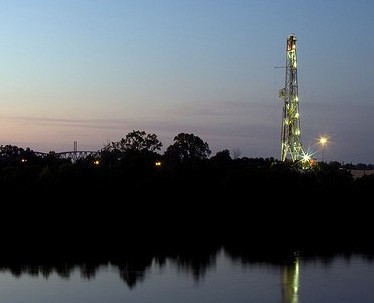
That's a natural gas fracking well. You'd be well advised not to drink the water. (Photo by Daniel Foster/Flickr)
Pennsylvania’s largest practitioner of hydraulic fracturing for natural gas, Chesapeake Energy, has suspended operations in the state — not because of any government action, but voluntarily, after a string of violations, accidents and blowouts. In the most recent and one of the most serious, Chesapeake lost control of a well for more than 12 hours after a blowout on April 20. Thousands of gallons of toxic drilling fluids spilled onto farm fields and into streams, and seven families were subjected to sudden, middle-of-the-night evacuations.
If you don’t read the Scranton, Pennsylvania Times-Tribune or the Pittsburgh Post-Gazette, you probably don’t know about the disaster. Or about a blowout last June in which an EOG Resources well shot a 75-foot geyser of methane and toxic fluids into the air for hours. Or the explosion and fire last July 23 at a Huntley and Huntley well that killed two workers. Or about Chesapeake Energy’s 30 notices of violations this year from the state Department of Environmental Protection. The DEP has issued 284 such notices since 2008, and has undertaken 68 enforcement actions against the company.
Hydraulic fracturing is the latest sneeze in the natural-gas business. It involves drilling a thousand feet or so down into certain shale formations (such as the Marcellus Shale that underlies much of the northeastern United States), injecting millions of gallons of water laced with a witches’ brew of toxic chemicals under enormous pressure to blow apart the shale and release the natural gas bubbles trapped in it. For details about the process, its invention by Halliburton, its protection by the Dick Cheney White House, and some earlier disasters, see this Daily Impact post of 18 months ago (well before the appearance of the acclaimed documentary Gasland): “A Frack Job for Marcellus.”
New York’s governor shut down fracking in his state last December (“New York Bans Fracking for Natural Gas“) pending a study of its dangers. Now that much of the activity in Pennsylvania has lurched to a halt, what’s next? In all probability a return to business as usual.
Even though gas prices are not as high as the industry would like right now, that will no doubt change soon because of the inexorable tightening of the petroleum supply worldwide, as major oil fields continue to peter out and demand from China and India continues to skyrocket. The pious platitudes of the drillers about “a Saudi Arabia of natural gas,” and “energy independence,” and “clean-burning natural gas” have bought them a lot of friends in high places. That, along with gazilllions of dollars in campaign cash.
A case in point: The new Republican governor of Pennsylvania, Tom Corbett, a few weeks ago notified the staff of the DEP that any enforcement action proposed against oil and gas operators must henceforth be cleared by political appointees. John Hines. Former DEP director, called this an “extraordinary directive” that “represents a break from how business has been done in the department within the Marcellus Shale and within the oil and gas program for probably 20 years.” Used to be, if the operators broke the law or ignored the regulations, department staff took action. No longer.
Despite the new laxity at the top (Corbett is a big fan of fracking), the DEP did in fact have a regulation that the gas operators had to have a local emergency response team to deal with any emergencies. Yet in the latest blowout, the drillers waited 13 hours for the arrival of a team from Texas (company name — I am not making this up — Boots and Coots) to get the well completely bolted back down (they had already acted to contain the spread of the noxious fluids, for which we are grateful). The DEP last week issued a notice of violation (actually a notice of several violations, you can read it here), apparently with the reluctant approval of the politicos.
Interestingly, and typically, even in a climate of laissez faire, not to mention laissez les bons temps rouler, the big guys seem to find a way to fall on their faces under the weight of their own, um, attitudes. The problem lies in the number of people on whom they fall.
See Also:
60 Minutes on Natural Gas: A Couple Minutes Short
EPA to Halliburton: Raise Your Right Hand
Risky Business: Another Well Blows
FYI – Boots and Coots is a really well-known and respected outfit in the oil industry. Probably second best known only after Red Adair’s outfit (recall the movie starring John Wayne was based upon Red Adair).
Taking care of bad well blowouts and fires and such is a highly specialized business requiring a rather exotic skill set, and not within the normal abilities of local emergency response teams.
You seem to lack an appreciation for the risks and dangers involved in drilling deep wells into places where everything is under immense pressures, flammable, and sometimes toxic. As, no doubt, do many of the employees of PA DEP. Energy extraction is rarely pretty, and often dirty. This ain’t news.
Loved the movie, and yes, my smirk at their odd sounding name was a cheap shot. Unworthy. But it is not the case that I do not appreciate the multiplying dangers or extracting energy from deeper, farther, more difficult places. It is those dangers that spur me to advocate a different course.
Appreciate your setting me straight on Boots and Coots.